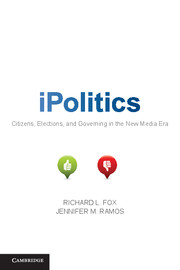Book contents
- Frontmatter
- Contents
- List of Tables and Figures
- Contributors
- Preface and Acknowledgments
- Introduction
- Section I The Shifting Media Universe and News Consumers
- Section II Campaigns and Elections in the New Media Environment
- Section III Civic Mobilization and Governance in the New Information Age
- 7 Preaching to the Choir or Converting the Flock
- 8 Twitter and Facebook
- 9 The Dog That Didn't Bark
- 10 New Media and Political Change
- Index
- References
10 - New Media and Political Change
Lessons from Internet Users in Jordan, Egypt, and Kuwait
from Section III - Civic Mobilization and Governance in the New Information Age
Published online by Cambridge University Press: 05 June 2012
- Frontmatter
- Contents
- List of Tables and Figures
- Contributors
- Preface and Acknowledgments
- Introduction
- Section I The Shifting Media Universe and News Consumers
- Section II Campaigns and Elections in the New Media Environment
- Section III Civic Mobilization and Governance in the New Information Age
- 7 Preaching to the Choir or Converting the Flock
- 8 Twitter and Facebook
- 9 The Dog That Didn't Bark
- 10 New Media and Political Change
- Index
- References
Summary
The other chapters in this volume consider the impact of new media environments on Western democratic societies. Because culture and context in part construct the meaning and implication of technology diffusion, one might wonder how new media and information capabilities will affect citizens in non-Western, nondemocratic societies (Chen, Boase, and Wellman 2002; Ess, Sudweeks, and Herring 2001). The key questions posed by this edited volume take on new significance when applied to the Middle East because, as a study of the Arab blogosphere observes, “in a part of the world where print and broadcast media traditionally have been controlled by the government, digital networked spaces offer the possibility of a much richer public sphere than existed before” (Etling et al. 2009: 46). Thus new media networks in the Arab world have the potential to reshape relations between citizens and the state. However, will new media environments produce a more informed and active citizenry in authoritarian, non-Western contexts? More specifically, will new information environments change political norms and practices in the Arab world? Will new media capabilities affect government accountability in the region? Answers to these questions are considered in more detail in this chapter in light of empirical research conducted between 2004 and 2009 in three Arab countries: Jordan (2004), Egypt (2004), and Kuwait (2009).
The primary argument developed in the following pages is that the Internet and social media are being used in the Arab world to mobilize the masses to demand better governance. The data analyzed in the case studies are clear evidence both of changing norms and social practices and of a better informed and active citizenry. These findings help explain the foundations of the 2011 “Twitter revolutions” in the region. This chapter explores reasons for expecting more citizen participation in government in the Middle East and North Africa, although they are tempered by cautious realism.
- Type
- Chapter
- Information
- iPoliticsCitizens, Elections, and Governing in the New Media Era, pp. 259 - 288Publisher: Cambridge University PressPrint publication year: 2011



